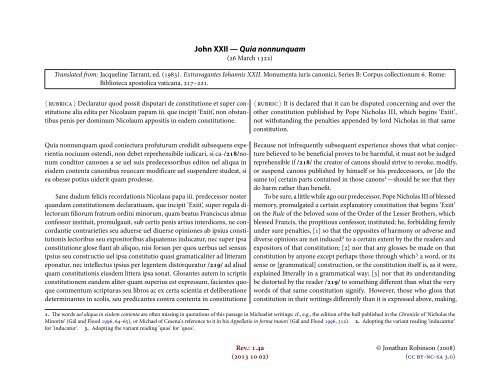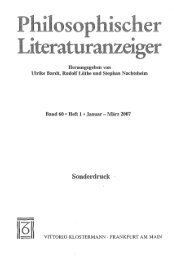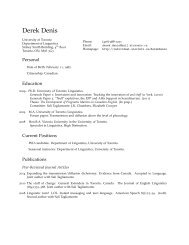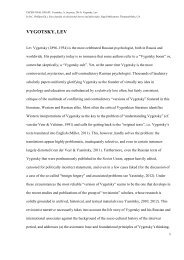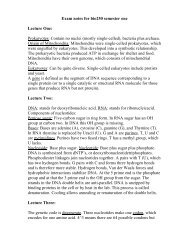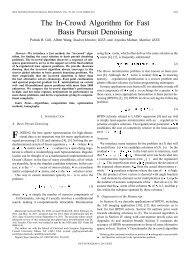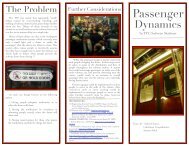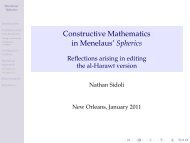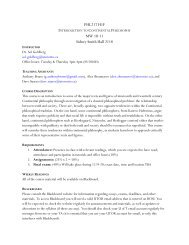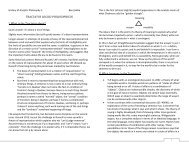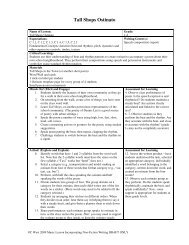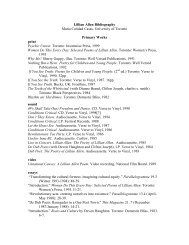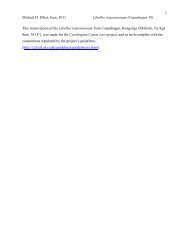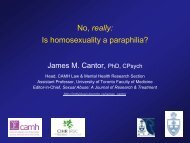John XXII, Quia nonnunquam
John XXII, Quia nonnunquam
John XXII, Quia nonnunquam
Create successful ePaper yourself
Turn your PDF publications into a flip-book with our unique Google optimized e-Paper software.
<strong>John</strong> <strong>XXII</strong> — <strong>Quia</strong> <strong>nonnunquam</strong><br />
(26 March 1322)<br />
Translated from: Jacqueline Tarrant, ed. (1983). Extravagantes Iohannis <strong>XXII</strong>. Monumenta iuris canonici, Series B: Corpus collectionum 6. Rome:<br />
Biblioteca apostolica vaticana, 217–221.<br />
〈 RUBRICA 〉 Declaratur quod possit disputari de constitutione et super con- 〈 RUBRIC 〉 It is declared that it can be disputed concerning and over the<br />
stitutione alia edita per Nicolaum papam iii. que incipit ‘Exiit’, non obstan- other constitution published by Pope Nicholas III, which begins ‘Exiit’,<br />
tibus penis per dominum Nicolaum appositis in eadem constitutione. not withstanding the penalties appended by lord Nicholas in that same<br />
constitution.<br />
<strong>Quia</strong> <strong>nonnunquam</strong> quod coniectura profuturum credidit subsequens expe- Because not infrequently subsequent experience shows that what conjecrientia<br />
nociuum ostendi, non debet reprehensibile iudicari, si ca-/218/no- ture believed to be beneficial proves to be harmful, it must not be judged<br />
num conditor canones a se uel suis predecessoribus editos uel aliqua in reprehensible if /218/ the creator of canons should strive to revoke, modify,<br />
eisdem contenta canonibus reuocare modificare uel suspendere studeat, si or suspend canons published by himself or his predecessors, or [do the<br />
ea obesse potius uiderit quam prodesse.<br />
same to] certain parts contained in those canons 1 —should he see that they<br />
do harm rather than benefit.<br />
Sane dudum felicis recordationis Nicolaus papa iii. predecessor noster To be sure, a little while ago our predecessor, Pope Nicholas III of blessed<br />
quandam constitutionem declaratiuam, que incipit ‘Exiit’, super regula di- memory, promulgated a certain explanatory constitution that begins ‘Exiit’<br />
lectorum filiorum fratrum ordini minorum, quam beatus Franciscus almus on the Rule of the beloved sons of the Order of the Lesser Brothers, which<br />
confessor instituit, promulgauit, sub certis penis artius interdicens, ne con- blessed Francis, the propitious confessor, instituted; he, forbidding firmly<br />
cordantie contrarieties seu aduerse uel diuerse opiniones ab ipsius consti- under sure penalties, [1] so that the opposites of harmony or adverse and<br />
tutionis lectoribus seu expositoribus aliquatenus inducatur, nec super ipsa diverse opinions are not induced 2 to a certain extent by the the readers and<br />
constitutione glose fiant ab aliquo, nisi forsan per quos uerbus uel sensus expositors of that constitution; [2] nor that any glosses be made on that<br />
ipsius seu constructio uel ipsa constitutio quasi gramaticaliter ad litteram constitution by anyone except perhaps those through which 3 a word, or its<br />
eponatur, nec intellectus ipsius per legentem distorqueatur /219/ ad aliud sense or [grammatical] construction, or the constitution itself is, as it were,<br />
quam constitutionis eiusdem littera ipsa sonat. Glosantes autem in scriptis explained litterally in a grammatical way; [3] nor that its understanding<br />
constitutionem eandem aliter quam superius est expressum, facientes quo- be distorted by the reader /219/ to something different than what the very<br />
que commentum scripturas seu libros ac ex certa scientia et deliberatione words of that same constitution signify. However, those who gloss that<br />
determinantes in scolis, seu predicantes contra contenta in constitutione constitution in their writings differently than it is expressed above, making,<br />
1. The words uel aliqua in eisdem contenta are often missing in quotations of this passage in Michaelist writings; cf., e.g., the edition of the bull published in the Chronicle of ‘Nicholas the<br />
Minorite’ (Gál and Flood 1996, 64–65), or Michael of Cesena’s reference to it in his Appellatio in forma maiori (Gál and Flood 1996, 312). 2. Adopting the variant reading ‘inducantur’<br />
for ‘inducatur’. 3. Adopting the variant reading ‘quas’ for ‘quos’.<br />
Rev.: 1.4a<br />
(2013 10 02)<br />
© Jonathan Robinson (2008)<br />
(CC BY-NC-SA 3.0)
<strong>John</strong> <strong>XXII</strong>, <strong>Quia</strong> <strong>nonnunquam</strong> (1322)<br />
predicta, uel aliqua seu aliquod predictorum, non obstantibus aliquibus also, a commentary, writings, or books, and determining in the schools on<br />
priuilegiis seu indulgentiis aut litteris apostolicis quibuscumque personis the basis of certain knowledge and deliberation, or preaching against the<br />
dignitatibus ordinibus aut locis religiosis uel secularibus generaliter uel sin- contents of the said constition, or [doing] one or the other of the aforesaid,<br />
gulariter sub quacumque forma uel expressione uerborum concessis, que notwithstanding other privileges or indulgences or apostolic letters for<br />
noluit aliquibus in predictis quomodolibet suffragari, ipso facto excommu- certain persons, dignities, orders or places (religious or secular), generally<br />
nicationis sententie uoluit suiacere.<br />
or individually, granted under a a certain form or expression of words,<br />
which he did not wish support in certain of the aforesaid in any way, by that<br />
very fact he wished to submit [them] to the sentence of excommunication.<br />
Nos autem attendentes quod argumentis frequenter et collationibus But we—attending that a hidden truth may be oppened often by arlatens<br />
ueritas aperiatur, quodque sub eadem littera sepe latet multiplex guments and conferences, and that a multiform understanding often lies<br />
intellectus, necnon esse difficile uolentibus constitutionem predictam per- hidden under the same words, and indeed that it is difficult to avoid the<br />
fecte legere ac intelligere penas adiectas in constitutione huiusmodi deuitare, added penalties in a constitution of this kind for those who wish to perfectly<br />
uiam ueritati aperire uolentes, ac periculis que ex predictis possent litterate read and understand the aforesaid constitution—wishing to open a way<br />
persone precipue scolastice incurrere salubriter obuiare, presertim /220/ to truth, and to sidestep salubriously the dangers that can occur from the<br />
cum de nouo suborta sint aliqua dubia, circa que posset periclitari ueritas aforesaid to educated (particularly scholastic) persons, especially since some<br />
et erroribus uia pandi, nisi liceret conferre super contentis in constitutione doubts have recently arisen concerning which truth can be endangered, and<br />
huiusmodi et etiam disputare, prohibitiones et penas predictas, tam latas a way be opened to erros unless it be licit to confer, and even debate, on the<br />
quam comminatas, et earum effectus, in fratrum nostrorum ac multorum contents of a constitution of this sort—we consider, by apostolic authority,<br />
achiepiscoporum episcoporum et aliorum prelatorum necnon multorum the prohibitions, aforesaid penalties, both reported and threatened, and<br />
professorum utriusque iuris et multorum sacre theologie magistrorum their effects, to be suspended at the pleasure of the Apostolic See as long as<br />
presentia, dum consistorium teneremus, auctoritate apostolica duximus we hold a consistory in the presence of our brothers and many archbishops,<br />
usque ad sedis apostolice beneplacitum suspendendas. Per suspensionem bishops, and other prelates, as well as many professors of both laws and the<br />
autem huiusmodi nequaquam licentiam cuiquam intendimus impertiri, masters of sacred theology. By a suspension of this sort, however, we by no<br />
quod contra fratrum regulam predictorum dogmatizare scibere seu deter- means intend to grant a licence to anyone that it be licit to dogmatize, write,<br />
minare, predicare seu praue loqui liceat publice uel occulte, quinimmo hoc or determine, preach, or speak wickedly against the Rule of the aforesaid<br />
omnibus et singulis auctoritate apostolica districtius inhibemus. brothers, publicly or secretly. On the contrary, we prohibit this even more<br />
strictly by apostolic authority to each and every one.<br />
Ne autem imposterum premissorum prohibitionum et penarum suspen- But in order that the suspension of the mentioned prohibitions and<br />
sio in dubium reuocari ualeat ne alicui propter defectum proba-/221/tionis penalties not be able to be called back into doubt in the future, in order that,<br />
impingi quod uelut transgressor prohibitionum ipsarum in penam seu due to a defect of proof, it not be able to be claimed of someone that he has<br />
penas inciderit antedictas, nos, uolentes super hoc de oportuno remedio fallen into the penalty or the aforesaid penalties like a transgressor of those<br />
prouidere, cartas seu membranas suspensionem continentes eandem ap- prohibitions, we, wishing to provide for this from an advantagous remedy,<br />
pendi seu affigi in maioris ecclesie Auinionensis ostiis seu superliminaribus shall ensure that letters and parchments containing the same suspension<br />
faciemus, que suspensionem predictam suo quasi sonoro preconio et patulo are nailed or affixed on the doors or lintels of the greater church of Avignon,<br />
— 2 —
<strong>John</strong> <strong>XXII</strong>, <strong>Quia</strong> <strong>nonnunquam</strong> (1322)<br />
iudicio publicabunt.<br />
which publicize the aforesaid suspenstion with an, as it were, sonorous<br />
proclamation and an open opinion.<br />
Datum Auinione vii. kalendas aprilis anno sexto. Dated in Avignon 26 March 1322.<br />
Works Cited<br />
Gál, Gedeon and David Flood, eds. (1996). Nicolaus Minorita: Chronica. Documentation on Pope <strong>John</strong> <strong>XXII</strong>, Michael of Cesena and The Poverty of Christ<br />
with Summaries in English. A Source Book. St. Bonaventure, NY: The Franciscan Institute.<br />
Tarrant, Jacqueline, ed. (1983). Extravagantes Iohannis <strong>XXII</strong>. Monumenta iuris canonici, Series B: Corpus collectionum 6. Rome: Biblioteca apostolica<br />
vaticana.<br />
— 3 —


